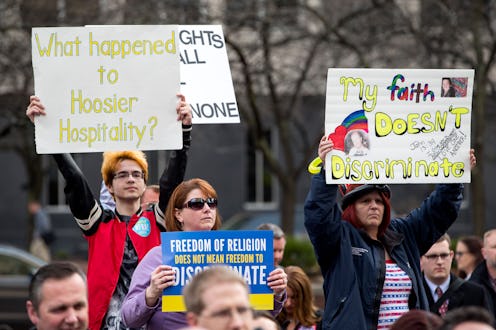News
What Goes Into A State Boycott?
In the week since Indiana passed a religious freedom law, widespread backlash has seen others states turn their backs to the Hoosier State. Connecticut, New York, and Washington all banned state-funded travel to Indiana after Gov. Mike Pence signed the religious freedom bill into law last Thursday, which, critics say, allows Indiana businesses to refuse services and discriminate against LGBT individuals. But how does a state boycott another? Turns out travel bans are just the first step.
A boycott starts with assessing what tax dollars are used to support another state — in this case, Indiana. The intention is to prevent one state's tax money from subsidizing another and, in theory, from supporting a potentially discriminating law. The states and cities that are boycotting Indiana are banning lawmakers and city employees from using taxpayer money for city-funded trips. States include Connecticut, New York, and Washington. Cities with travel bans include Washington, D.C., Denver, Seattle, San Francisco, and West Palm Beach, Florida.
While some have allowed exceptions to their boycotts — San Francisco Mayor Edwin M. Lee halted work-related trips to Indiana unless the trip was for public health and safety — others have chosen to take additional measures. Seattle Mayor Ed Murray said he would also order all city departments to review their contracts and see where the city is doing business with Indiana.
But is boycotting Indiana effective? The hashtag #BoycottIndiana continues to trend as celebrities and individuals have joined public officials in condemning Indiana's religious freedom law. Blogger and political activist Melissa McEwan, however, argues that boycotting doesn't help Indiana workers, which include LGBT employees.
What a generalized boycott of Indiana would do is harm working people — among whom are queer business owners, as well as queer employees of inclusive and supportive employers, and also queer employees of discriminatory employers, because that’s the only job they can get in a state with far too few jobs.
She also argued that the people most likely to benefit from #BoycottIndiana are those from the outside, the retweeters whose words make themselves feel good but have little impact for change.
And let’s be honest here: It isn’t like the vast majority of people who are cheering “Boycott Indiana!” had any plans to visit Indiana and spend money in this state, anyway. It’s just a slogan to shout at a state they perceive to be full of fat, poor, lazy, conservative, straight, cis, white people.
Shouting out loud can work though. After receiving pressure from residents and LGBT advocates, Arkansas Gov. Asa Hutchinson this week sent a religious freedom bill back to lawmakers to include provisions that would bar discrimination. While a social movement might not produce the exact results it usually seeks, it's better to speak up than sit silent on the sidelines. A boycott, as symbolic as it may be, won't just fall on deaf ears.
Image: Getty Images (1)
